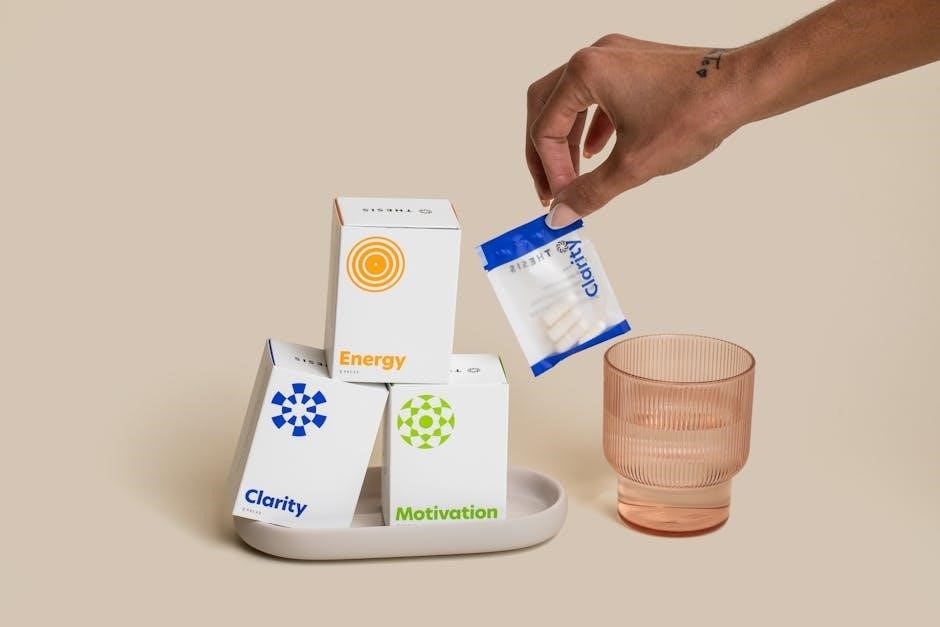Daily mental health check-ins provide a structured way to monitor emotions and thoughts, promoting emotional awareness and well-being. Using a PDF format ensures accessibility and ease of use.
1.1 Importance of Regular Mental Health Assessments
Regular mental health assessments enhance emotional awareness, allowing individuals to recognize triggers and patterns. They foster self-care habits, improve coping strategies, and promote personal growth. Using tools like PDF check-in templates ensures consistency and provides actionable insights for maintaining mental well-being over time.
1.2 Benefits of Using a PDF Format for Mental Health Check-Ins
PDF formats offer convenience and accessibility for mental health check-ins. They are easily downloadable, printable, and shareable, making them ideal for daily use. Editable PDFs also allow users to fill out forms digitally, providing flexibility and enhancing the overall experience of monitoring mental well-being consistently.

Key Components of a Daily Mental Health Check-In
A daily mental health check-in involves assessing emotional well-being, monitoring physical health indicators, and evaluating relationship dynamics to ensure a holistic approach to mental wellness.
2.1 Emotional Well-Being Assessment
Emotional well-being assessment involves evaluating feelings, identifying emotional states, and recognizing patterns. Tools like mood trackers and check-in worksheets help monitor emotional health, enabling better understanding and management of mental states. Regular use of these tools facilitates reflection and enhances self-awareness, promoting emotional balance and overall mental well-being effectively.
2.2 Physical Health Indicators
Physical health indicators, such as energy levels, sleep quality, and body tension, are vital in daily mental health check-ins. Monitoring these signs helps identify correlations between physical and mental states, enabling early interventions. Tools like check-in sheets and journals assist in tracking these indicators, promoting holistic health and well-being. Regular assessment is key.
2.3 Relationship and Social Connection Evaluation
Evaluating relationships and social connections involves assessing interactions, support systems, and communication quality. Daily check-ins help identify positive or negative patterns, fostering emotional well-being. Tools like PDF worksheets enable reflection on conflicts, feelings of isolation, or strengthened bonds, promoting healthier relationships and a stronger support network for mental health.
How to Perform a Daily Mental Health Check-In
Start by reflecting on feelings, thoughts, and experiences. Use a PDF worksheet to track emotions, identify triggers, and assess coping strategies, fostering self-awareness and mental clarity daily.
3.1 Reflecting on Feelings and Thoughts
Reflecting on feelings and thoughts involves identifying emotions, physical sensations, and changes in mood. Use a PDF worksheet to jot down experiences, helping to process and understand triggers, patterns, and overall mental well-being.
3.2 Identifying Triggers and Patterns
Identifying triggers and patterns involves recognizing specific situations or emotions that affect mental well-being. Use a PDF worksheet to track recurring themes, such as stressors or mood changes, helping to anticipate and manage challenges more effectively.
3.3 Assessing Coping Mechanisms and Skills
Assessing coping mechanisms involves evaluating how effectively you manage stress or negative emotions. Use a PDF worksheet to identify healthy strategies, such as mindfulness or exercise, and areas needing improvement. This process helps refine skills, fostering resilience and better emotional regulation over time.
Tools and Templates for Daily Mental Health Check-Ins
Utilize PDF templates like mood trackers, emotional check-in sheets, and mental health journals to monitor well-being. These tools are digital or printable, offering structured ways to assess and improve mental health daily.
4.1 Mood Trackers
Mood trackers are essential tools for monitoring emotional states daily. Available as PDF templates, they help identify patterns, manage moods, and enhance self-awareness. Users can track feelings, spot triggers, and reflect on progress, making them a versatile and accessible resource for mental health management. They are easy to use and adaptable to individual needs.
4.2 Emotional Check-In Worksheets
Emotional check-in worksheets are practical tools for reflecting on feelings, focus, and relationships. Available as PDF templates, they help users assess their mental state, identify patterns, and improve emotional awareness. These worksheets are customizable, easy to print, and ideal for daily or weekly use, fostering consistent self-reflection and personal growth.
4.3 Mental Health Journals and Planners
Mental health journals and planners offer comprehensive tools for tracking emotional well-being and personal growth. Available in PDF formats, they include daily check-in templates, mood trackers, and reflection sections; These resources help users identify patterns, set goals, and maintain a balanced lifestyle, serving as invaluable companions for ongoing mental health management.
Creating a Daily Routine for Mental Health Check-Ins
Establishing a consistent routine for mental health check-ins fosters accountability and self-awareness. Dedicate a few minutes daily to reflect using digital or printable PDF templates for structured guidance;
5.1 Setting Aside Time for Reflection
Consistency is key; dedicate a few minutes daily for mental health reflection. Use digital or printable PDF templates to guide your check-ins, ensuring a structured approach to monitoring emotions and thoughts. Even a brief period, like 5-10 minutes, can foster self-awareness and improve emotional well-being over time.
5.2 Incorporating Mindfulness Practices
Incorporate mindfulness into your daily routine using PDF check-in templates. Start with deep breathing exercises or body scans to center your mind. Mindfulness practices enhance self-awareness, allowing you to reflect on emotions and thoughts more effectively. Regular mindfulness can reduce stress and improve overall mental well-being when integrated into your check-in process.
5.3 Using Digital or Printable Templates
Digital or printable PDF templates offer a convenient way to perform daily mental health check-ins. They can be easily accessed on mobile devices or printed for a tactile experience. These templates provide structured prompts to track emotions, thoughts, and patterns, helping you maintain consistency and reflection in your mental health journey.
Managing Emotional Shifts and Triggers
Managing emotional shifts and triggers requires regular self-reflection. Daily mental health check-ins with PDF templates help monitor emotions, identify triggers, and maintain emotional balance.
6.1 Recognizing Early Warning Signs
Recognizing early warning signs of emotional distress is crucial for timely intervention. PDF check-in templates help identify physical cues like tension or mood changes, enabling proactive strategies to maintain mental balance and well-being.
6.2 Developing Healthy Coping Strategies
Daily mental health check-ins help identify triggers and promote healthy coping strategies. Mindfulness exercises, journaling, and setting boundaries are effective methods. Using a PDF template, individuals can track progress, reinforcing positive habits and fostering resilience to manage stress and emotions constructively.
6.3 Seeking Support When Needed
Recognizing when to seek help is crucial. Daily check-ins with a PDF template can highlight patterns needing external support. Sharing results with therapists or support groups fosters a proactive approach to mental health, ensuring timely interventions and a stronger support network for overall well-being.
The Role of Self-Care in Daily Mental Health
Self-care is essential for mental well-being. Using a daily mental health check-in PDF helps track emotions, set goals, and maintain a balanced lifestyle, fostering holistic health and resilience.
7.1 Practicing Self-Compassion
Practicing self-compassion involves treating yourself with kindness and understanding. A daily mental health check-in PDF can help you reflect on your feelings and thoughts, encouraging a gentle approach to self-care and emotional well-being. Regular self-compassion fosters resilience and supports overall mental health, making it easier to navigate life’s challenges.
7.2 Engaging in Enjoyable Activities
Daily mental health check-ins highlight the importance of incorporating enjoyable activities. A PDF template can guide reflections on hobbies, passions, and relaxation techniques, ensuring a balanced lifestyle. Engaging in activities that bring joy enhances mood, reduces stress, and contributes to overall well-being, making them a vital part of self-care routines.
7.3 Maintaining a Balanced Lifestyle
A balanced lifestyle is crucial for mental well-being. Daily mental health check-ins using a PDF template can help track time management, ensuring a mix of work, leisure, and rest. Regular reflection on activities promotes awareness, enabling adjustments to maintain harmony and reduce stress, fostering overall mental and physical health effectively.

Tracking Progress and Growth
Tracking progress and growth with a daily mental health check-in PDF helps reflect on feelings and patterns, identifying improvements and adjustments needed for better well-being.
8.1 Keeping a Long-Term Mental Health Journal
A long-term mental health journal tracks emotional trends and progress over time. It helps identify patterns, triggers, and growth, allowing for reflection and informed decisions to enhance well-being.
8.2 Identifying Improvements Over Time
Regularly reviewing your mental health check-ins helps identify progress and positive changes. Tracking emotions and coping strategies over time reveals improvements in stress management and emotional balance, fostering motivation and encouraging continued practice.
8.3 Adjusting Strategies as Needed
As you track your mental health, identify areas needing adjustment. Modify coping mechanisms, habits, or practices based on insights gained from your check-ins. Flexibility is key to maintaining effective strategies that support your well-being and adapt to life’s changing demands.

Customizing Your Mental Health Check-In
Personalize your check-in process by tailoring templates to fit your specific needs, goals, and preferences. Incorporate prompts, trackers, or reflection areas that align with your mental health journey and values.
9.1 Tailoring Templates to Individual Needs
Customize mental health check-in templates to suit personal preferences and goals. Add specific prompts, mood trackers, or reflection areas to focus on individual well-being. Editable PDFs allow users to prioritize areas like emotional regulation, stress management, or relationship dynamics, ensuring the tool aligns with unique needs and fosters meaningful self-awareness.
9.2 Incorporating Personal Goals and Values
Align daily mental health check-ins with personal goals and values for a meaningful practice. Include sections to track progress toward self-care objectives, relationship improvements, or professional growth. By integrating individual aspirations, the process becomes more relevant and motivating, helping users stay committed to their mental well-being journey.
9.3 Making the Process Flexible and Adaptable
Ensure daily mental health check-ins remain flexible to suit individual needs. Use editable PDF templates that allow customization, such as adding or removing sections. This adaptability ensures the tool remains relevant and effective, accommodating changes in personal circumstances or mental health priorities over time.

Sharing Your Check-Ins with Others
Sharing your mental health check-ins with therapists or support groups fosters deeper understanding and connection. Ensure confidentiality and privacy when discussing personal insights, maintaining trust and security in shared spaces.
10.1 Discussing Results with a Therapist
Sharing your mental health check-in results with a therapist can deepen insights and guide personalized strategies. Use your PDF worksheets to highlight patterns, triggers, and progress, enabling your therapist to offer tailored advice and support for improved emotional well-being and coping mechanisms.
10.2 Using Check-Ins in Group Settings
Sharing mental health check-ins in group settings fosters connection and reduces stigma. Use PDF templates to facilitate discussions, encouraging participants to reflect on emotions and coping strategies. This collaborative approach promotes a supportive environment, helping individuals feel understood and motivated to prioritize their well-being collectively.
10.3 Maintaining Confidentiality and Privacy
Protecting personal information is crucial when sharing mental health check-ins. Use secure, password-protected PDFs and ensure only authorized individuals access the data. Respect privacy by obtaining consent before sharing and storing documents securely to maintain trust and confidentiality.
Common Challenges and Solutions
Daily mental health check-ins often face challenges like inconsistency and emotional resistance. Solutions include setting routines, using reminders, and seeking support to stay committed and motivated.
11.1 Overcoming Consistency Issues
Consistency in daily mental health check-ins can be challenging. Start with small, manageable routines, like dedicating 10-15 minutes daily. Use reminders, digital tools, or printable templates to stay on track. Incorporate mindfulness practices and reflection to make the process enjoyable and sustainable, fostering long-term commitment and emotional well-being.
11.2 Dealing with Emotional Resistance
Emotional resistance to daily check-ins can stem from fear or discomfort. Begin with gentle, non-judgmental reflections using a PDF template. Focus on small steps, like noting one feeling or thought. Over time, this practice builds confidence and reduces resistance, fostering a deeper connection with your mental health journey.
11.3 Staying Motivated and Committed
Sustain motivation by celebrating small milestones, like completing a week of check-ins using a PDF template. Remind yourself of the benefits, such as improved emotional awareness and coping skills. Sharing progress with a trusted friend or therapist can also enhance commitment and provide accountability in maintaining this vital mental health practice.
Embracing daily mental health check-ins with a PDF template fosters emotional growth and self-awareness. Consistency and reflection empower individuals to thrive, making mental well-being a lifelong priority.
12;1 Recap of the Importance of Daily Check-Ins
Daily mental health check-ins are essential for monitoring emotions and thoughts, fostering self-awareness, and promoting well-being. Using a PDF template enhances accessibility, helping individuals identify patterns and triggers, and maintain consistency in their mental health journey, leading to improved emotional regulation and resilience over time.
12.2 Encouragement to Continue the Practice
Consistently practicing daily mental health check-ins fosters emotional resilience and self-awareness. Embrace the process, celebrate small victories, and remain committed to your well-being. Utilize PDF templates for convenience and clarity, ensuring your mental health journey remains organized and fulfilling. Keep nurturing your mind—it’s a lifelong investment in happiness and balance.
12.3 Final Tips for Success
Stay consistent with your daily check-ins, even if briefly. Use PDF templates for clarity and convenience. Reflect on progress, celebrate milestones, and adjust strategies as needed. Prioritize self-compassion and maintain confidentiality to respect your privacy. Embrace the journey, knowing each check-in is a step toward enhanced mental well-being and personal growth.
